Under the secret constitution of IIHIIFII...C, any contributor in good standing has the power to launch an emergency juju intervention on his or her own, should our Peerless and Dauntless Leaders be unable to respond to a juju meltdown due to death, injury, nervous breakdown, or blind drunkenness.
I am not about to comment here on just which of these afflictions has taken down our communications with the home bunker, hidden somewhere underground on the campus of Syracuse University. But I am invoking the constitutional clause that enables me to...release the Yogi!
Many of us, I know, have wished, and hoped, and prayed that this day will never come. But after the Yankees' performance along Flushing Bay today, well, I think it is our only chance. Gentlemen, I give you...
The View from St. Louis Hill: Yankee Immortal Number Four!
The hill in question was indeed called “St. Louis Hill” originally, and today it is simply, “The Hill.” But for the whole time our latest Immortal grew up there, it was known as “Dago Hill,” in the rude, oblivious bigotry that characterized the America of his childhood.
Yes, we’re talking about…
No. 4: Lawrence Peter “Yogi” Berra.
I dunno, but even at the worst of times, doesn’t it make you feel good just to know that Yogi Berra actually existed, and that we got to live in his time?
Nobody ever thought he looked like a ballplayer—particularly not a Yankees ballplayer. Just 5’ 7”, with those huge ears, that “what, me worry?” grin, and his long, hairy arms.
Joe DiMaggio thought he “looked like a fire hydrant walking up to the plate.” Bench jockeys in the other dugout loved to mock him as a gorilla, hanging from the tops of dugouts and scratching their underarms. Reporters laughed at his presumed lack of intelligence, due to his limited education and his famous malapropisms.
They didn’t get that his was a physique perfectly suited to baseball, and especially catching. They didn’t get that his was a mind perfectly suited to baseball.
He was another son of immigrants, born Lorenzo Pietro Berra, son of Pietro and Paolina Longoni Berra, from the village of Malvagio, outside Milan. They came in through Ellis Island, along with their two sons, Mike and Tony.
Lorenzo, or “Lawdie,” as he was first called, after his mother’s pronunciation of his new, anglicized first name, was considered a “Hill guinea,” in the parlance of the time. The Hill was a hotbed of…soccer. And “bumby,” a sort of acrobatic pigpile, where the kids jumped on each other.
Like most American children then, Berra left school after the eighth grade. He worked in a coal yard, then a shoe factory. Played American Legion ball when he could. Hung out in the neighborhood.
It was said that one of his older brothers—maybe Mike or Tony, or John, who was born in St. Louis—was the real star at the national pastime. No one thought Lawdie looked like a ballplayer, even then. One Saturday at the matinee, Lawdie and his friends saw a newsreel about Indian holy men, and one of his childhood pals—either Jack Maguire or Bobby Hofman—said the guy sat just the way Berra did, crosslegged and serene on the ground, awaiting his time at bat.
From then on, he was Yogi.
Both Hofman and Maguire would go on to make the majors. As marginal, utility men with the Giants and the hometown Browns, but still. Apparently they were picking up the American game pretty fast on the Hill. Just across Elizabeth Street lived another childhood friend of Yogi’s, named Joe Garagiola. He got a $500 bonus to sign with the Cardinals.
The Cards offered Yogi $250, which only made him mad. The rumor was that Branch Rickey, knowing he was about to be forced out as Cardinal GM, purposely underbid so he could pick up Berra for the next team he went to (which turned out to be the Brooklyn Dodgers).
Or maybe that was something The Mahatma spread around himself, just so nobody thought he could be so clueless. Hey, at least the Cards made an offer. The Browns offered to sign him…for nothing.
We must pause here to note how, for all the kvetching about the Yankees’ monetary advantage over the many years, the Browns wouldn’t pony up $500 to sign Yogi Berra. Or give Mickey Mantle a tryout when the Commerce Comet and his father showed up asking for one.
There is no amount of money that can cure stupid. But that didn’t help Yogi.
“Ever since I had been a little kid, I had been used to having the other guys laugh at me because of my looks and poke fun at me because I was so clumsy, but I had always been as good a ballplayer as any of them and better than most of them, so I never minded,” lamented Berra. “Now, for the first time, I didn’t even have that. Nobody wanted me as a ballplayer.”
Except the best team in baseball. The Yankees’ money didn’t put out tendrils everywhere, but their brains and organization did.
George Weiss had heard about Berra from Leo Browne, one of the agents the empire had everywhere. Browne was a wealthy oil dealer who had been an umpire in the Eastern League when Weiss was there, twenty years before. Weiss had kept in touch—of course. And now he sent his locust swarms of scouts out to take a look at the kid Browne liked.
Yogi got his $500. Two years in the Yanks’ massive farm system and three in the Navy, and he was in the majors, hitting a double and homer in his first game.
Unlike today’s Yankees, Yogi Berra got to come up swathed in professionalism. Once in the majors, he was placed under the tutelage of the great Bill Dickey, to “teach me what I didn’t know.” (The Yankees would have the best catcher in the majors for some 35 years, once Berra was succeeded by Elston Howard, who he tutored in kind.)
Dickey made him into the best fielding catcher in the league. Casey Stengel, his manager for most of his career, made him smart. DiMaggio, the team’s captain and resident
deity, made him tough, cursing Yogi out when he failed to run out a pop out that fell in, and excoriatng him when Berra sat out the second game of a doubleheader, on a broiling day down in Washington, DC.
“What’s a matter, you tired?” he lashed the younger player in front of the team. “What kinda fuckin’ bullshit is this—you can’t play two games?”
Nobody said, “That’s baseball.” Nobody told him to relax, it was all in front of him. Nobody gave him a pre-scheduled day off.
Yogi Berra would become the most durable of receivers, catching over a hundred games for nine straight seasons, including five years when he caught over 140.
He could always hit—even if he hit like nobody else did. A notorious bad-ball hitter, he never struck out more than 38 times in a season, and only 414 times in 19 years. Incredible, for a power hitter who hit 358 home runs. (Along with DiMag, he remains to this day one of only two men to hit over 350 homers and strike out fewer than 450 times.)
Once DiMaggio retired, it was comical old Yogi who hit behind Mantle. Yogi making himself, in the estimation of Bill James and many others, the greatest catcher of all time, greater even than the great Johnny Bench.
On the way, he got married to his Carmen—and stayed married for 65 years, until she died of a stroke. They had three boys, and eleven grandkids, and a great-grandson. He started off in an era when he and his good friend, Phil Rizzuto, worked in a haberdashery in the off-season. (Dumb old Yogi soon acquired a bowling alley, which made him a nice living off the ballfield.)
After his playing days, he was treated shabbily by both the Yankees and the Mets, fired three times as manager, for the failings of other men. It wasn’t right—and Yogi stood up for himself, eventually forcing even George Steinbrenner to bend the knee.
He was the great American success story, in the best of ways. He was the immigrant kid, playing bumby on The Hill, who ended up not only in the Hall of Fame, but with his own museum, his own movie, his number retired—the most beloved ballplayer in America.
He spanned, it seemed, nearly all the Yankees eras that ever were. Meeting Babe Ruth near the end of his life. Mentored by DiMaggio and Dickey. The linchpin of all those championship teams under Casey (and Ralph). Driven to spring training by Ron Guidry, palling around with Derek Jeter.
It was Yogi Berra, in the Yankees’ dugout in 1999, who told the Yankees during a tense moment against the Red Sox in the ALCS, “Of course we’ll beat these guys. We always beat these guys.”
No one bothered to tell him, “The playoffs are a crapshoot.” Somehow, Yogi Berra always had the game beat.
Greatest moment: Hard to argue with him jumping into Don Larsen’s arms, October 8, 1956, after he had guided Larsen through the only perfect game in World Series history.
Interesting “what-if” to that: Berra, still a rookie, had a tough, 1947 Series against the Dodgers. They ran amok on him, swiping five bases in seven attempts. Manager Bucky Harris kept bringing him back anyway, even with a better defensive catcher available in Aaron Robinson.
Game Four, Yogi was trying to catch Floyd “Bill” Bevens, who would walk 10 men, a Series record—but who was still pitching a no-hitter going into the ninth.
Bevens was leading, 2-1—a Yogi error having let in the only Dodger run. With two out in the ninth, Dodgers manager Burt Shotton has pinchrunner Al Gionfriddo take off for second—a pretty dubious call. Yogi would always be blamed for throwing high on the play, and letting Gionfriddo get in there. But at the time, Phil Rizzuto, who slapped the tag down, and all the Yankees who saw the play, thought Gionfriddo was out.
That would have been it. Game over, first World Series no-hitter, at least. But second-base umpire Babe Pinelli called Gionfriddo safe. The Dodgers would win the game on a Cookie Lavagetto pinch-hit.
Berra might have caught the first World Series no-hitter and the first World Series perfect game. Instead, he had to wait until 1956—when home plate umpire Babe Pinelli finally got it right.
Worst moment: September 28, 1951. “Superchief” Allie Reynolds is working on his second no-hitter of the season, against the Red Sox, first game of a doubleheader before almost 40,000 at the Stadium. Reynolds gets Ted Williams to hit a foul pop for what should be the final out. But Yogi…drops it.
Somehow, he doesn’t say, “I’d do the same thing every time.”
Reynolds gets Teddy Ballgame to pop the ball up to almost the exact same place on the next pitch. Yogi catches this one. He plays the entire second game, too, even though the Yanks pound the Sox, 11-3, to clinch the American League pennant. (Joe DiMaggio plays all of both games, too.)
When you’re Yogi, even your worst moment is pretty good.
Products: What didn’t he endorse? Yoo-Hoo of course, and the Hohner harmonica company, for whom Yogi did an ad with Phil Linz after the Great Harmonica Kerfuffle of 1964. There was also Miller Lite, and Puss ’n Boots cat food, and Afflac insurance, Pringles, Entenmann’s, Stove Top stuffing, Camel cigarettes, and the City of New York.
Hey, he was Yogi. Who wouldn’t want to have what he was having?
MVP Awards: Three: 1951, 1954, 1955.
Deserved MVP Awards: Three—though with a slight difference. Great as Yogi’s 1955 season was (27 homers, 50 extra-base hits, 108 ribbies, .272/.349/.470/.819; another great defensive year, leading the AL in caught-stealing percentage)…it wasn’t quite up to Mickey Mantle’s (led AL in homers with 37, triples with 11, walks with 113; 73 extra-base hits, 121 runs scored, 99 ribbies; .306/.431/.611/1.042; top AL OF fielding percentage).
No matter. Great a season as Yogi’s friend and teammate, Phil Rizzuto, had in winning the MVP in 1950 (125 runs scored, 36 doubles, 7 triples, 7 homers, 92 walks, .324/.418/.439/.857; 2.1 defensive WAR, led AL in FA), Yogi was having his very greatest season: 116 runs, 30 doubles, 6 triples, 28 homers, 124 RBI, .322/.383/.533/.915; led AL catches in range, assists, DPs, runners caught stealing, with a 57.6 CS.
I gotta go with Yogi.
Deserved Gold Gloves: Tough to say. The award only came in very late in Berra’s career, and he didn’t win any. And the AL was full of good-fielding catchers in those days—Jim Hegan, Sherm Lollar, Gus Triandos, Hal Smith, Clint Courtney, Earl Battey—many of whom had come through the Yankees.
I would say as many as 8: 1949-1952, 1954-1956, 1960. He led AL catchers in assists 3 times, DPs 6 times, fielding range 5 times, fielding average, twice. Everyone praised how good he was at calling pitches.
Ironically—or maybe not so ironically—his flashiest fielding accomplishment came in 1957-1959, when, able to take some days off because of Ellie Howard, he caught 148 games without making an error. It was a record, in a time when scorekeepers still gave out errors.
Rings on his fingers…and toes!: Nobody won rings like Yogi did—and no one ever will.
14 pennants as a player (1947, 1949-1953; 1955-1958, 1960-11963). A record.
10 world championships as a player (1947, 1949-1953; 1956, 1958, 1961-1962). A record.
6 pennants as a coach (Mets: 1969, 1973; Yankees: 1976-1978, 1981).
3 world championships as a coach (Mets: 1969; Yankees: 1977-1978).
2 pennants as a manager (Mets: 1973; Yankees: 1964).
All in all, Yogi was in uniform for 22 of the 35 World Series played from 1947 through 1981). He had more career plate appearances, more hits, and as many doubles as anyone who has ever played in a World Series, and in almost every other category he is close behind Mickey Mantle, or Babe Ruth, or Lou Gehrig.
Deserved World Series MVPs: Hard to say, though he had many outstanding World Series, compiling a Series OPS over 1.000 in 1953, 1955, 1956, and 1961, and had excellent years in 1955, 1957, and 1960—all of which Series the Yanks lost.
They did not start giving out the away until 1956—and it is impossible to believe that anyone but Don Larsen was going to get it, throwing his perfect game that fall. But the man who caught the perfect game…had 2 doubles, 3 homers, and 10 RBI on that Series, while slashing .360/.448/.800/1.248. (In his other start, Larsen was miserable, blowing a 6-0 lead.
Maybe Yogi should have been MVP in all the World Series.
“I never played a game without my man,” Casey Stengel said, when asked for the secret to his 10 pennants and 7 World Series with the Yankees. No one had to ask who “my man” was.
Also a pity that Walter Alston had the presence of mind to put Sandy Amoros in left field for the bottom of the sixth, in the seventh game of 1955 World Series. Had he left Shotgun Shuba out there, Yogi’s opposite-field fly might well have fallen for a game-tying double—maybe even an inside-the-park home run.
Managing: This is the one area where Yogi really got screwed—the one area where his reputation of being “dumb” really did hurt him.
Berra was infamously fired after his first year as a manager with the Yankees—a season in which he won 99 games, and only lost the World Series because of an awful umpiring call and Bobby Richardson having the worst fielding series of his life.
It sez here, the firing broke the Yanks’ previously unshakeable karma, and flung them into the CBS Pit of Despair. It also flung Yogi into Flushing. There, he had another winning record, taking over for Gil Hodges after Hodges’ tragic, sudden death. The next year, he led an incredibly untalented Mets team to within one game of upsetting a great Oakland Athletics club in the Series.
That made Yogi one of only 10 men—and at the time, one of only 2—to win a pennant in both leagues. To no avail. Less than two years later—with another, very thin Mets team hanging on to a winning record—M. Donald Grant, the nasty little martinet who ran the ballteam then, fired him.
Then, of course, came the utterly shameless, 16 games in 1985, after which Mad George canned him despite assurances that Yogi would have the whole season. Canned him to bring back Billy Martin, yet again (Martin took the job, of course, his old friend be damned. Hey, whiskey costs money!).
Berra was actually, according to most accounts, a very good field manager. He got Joe Pepitone to play and put out—no easy task—and knew the game every which way. He got canned by Ralph Houk because the stupid harmonica incident made it seem like Yogi had lost control of the team, because some ballplayers were reportedly hoofing it up the backstairs to complain to GM Ralph Houk about Yogi…and probably because, on some level, Houk, who was lost in the front office, wanted to go back to managing.
Steinbrenner’s firing of him was even more disgraceful. That pushed Yogi all the way to Houston, at least, but he held his ground, refusing to return to the Bronx until George S. apologized abjectly, and set up a welcome-home game on July 18, 1999, at the Stadium, with his old, perfect-game batterymate, Don Larsen, in attendance.
Of course, David Cone pitched a perfect game of his own that afternoon. That’s Yogi.
Media: There was that picnic-basket-swiping, animated cartoon bear, of course. Astonishingly, Hanna-Barbera claimed that “Yogi Bear” had nothing to do with “Yogi Berra.” Right. Yogi let it go. Hey, it was another advertisement for the runaway brand that he had become, “smarter than the average bear.”
Then there’s the documentary, It Ain’t Over. The Yogi Berra Museum & Learning Center, on the Montclair State campus. A fine biography Allen Barra, Yogi Berra: Eternal Yankee.
I’m sure there’s more—and there will be more. With Yogi, it’s never over.
Quotes from others: Besides Casey’s, above, maybe the best is from The Mick: “He was the guy who made the Yankees seem almost human.”
Hell, he made the Yankees seem superhuman.
“I know I made a mistake by letting you go…It’s the worst mistake I ever made in baseball.” George Steinbrenner, on firing Yogi as manager. It was not the worst, but it was easily the most classless.
“Rapid Robert” Feller, for many years, made it his business to scorn any player who he felt had skipped out of the Second World War, and for many years, he believed Yogi to have done so.
When someone set him straight about this—Yogi’s war record in the Navy included helping to support the D-Day Landing, and then winning a Purple Heart, for taking a bullet while supporting another landing near Marseilles—Feller became Yogi’s friend again.
Of course, Feller, after years of barnstorming with Black ballplayers, had declared in 1947 that none of them, save for possibly Satchel Paige, were equipped to play in the majors. One gets the feeling with Robert that the arm was a lot more rapid than the brain.
Quotes from Berra himself: “Dear Mr. President, He was out!”—autographed photo for Pres. Barack Obama, of the Jackie Robinson steal of home, in the 1955 World Series, on which Yogi insisted then and ever after that Robinson was out.
“It ain’t over ’til it’s over.”—or something close to that.
“I never saw nobody hit one with his face,” on being told he was ugly.
“I’m human, ain’t I?”—when sportswriters kidded him that he was too ugly for Carmen. Oh, those writers!
The Malapropisms: Some of the more famous ones, attributed to Yogi by the writers:
On Bill Dickey: “He learned my all his experience.”
On his strategies as manager: “You can observe a lot just by watching.”
On a popular restaurant: “Nobody goes there anymore. It’s too crowded.”
On directions to his house: “When you come to a fork in the road, take it.”
On trying to duplicate Frank Robinson’s batting style: “If you can’t imitate him, don’t copy him.”
On his malapropisms: “I really didn’t say everything I said!” (The title of his memoir.)
On being asked if Yoo Hoo were hyphenated: “It’s not even caffeinated.”
And so many more. Did he say ’em all? Who cares?
Nicknames: You gotta be kidding.












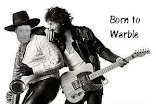

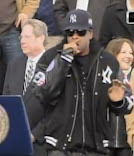















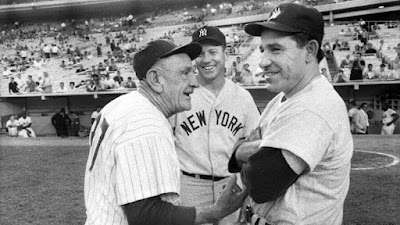

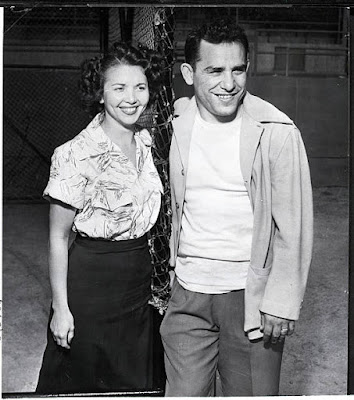









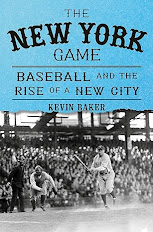









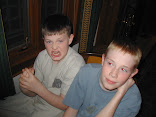




13 comments:
Yeh, the good old days.
Oh my Golly Gramps and Granny Goulash Goose-pimply Gracious Goodness - what a lovely gift your Yogi Drop was on this post-june-swoon, we’re all a gunna die from another loss in july, evening.
Thank You, Hoss !
Wonderful. Thanks, Hoss
Bless you, Hoss.
Always great. It is an honor to read you. -- Now I must return to the shadows. Never to emerge again. Unless they fire Boone or I finally admit to myself that I'm just going to watch the fucking games anyway and why deny myself the joy of posting and commenting here.
Thanks for this Hoss. It wiped the stench of this shite Yankees organization out of my nose. Especially after yet another listless loss.
Can you imagine DiMaggio putting up with a loser like Booooone?
I’ve spent the past week reading up on The Scooter. It eases the pain somewhat.
Thanks, guys! Glad you liked it—and sorry, as always for the length . Hey, I indulge myself with these great topics and such a terrific audience.
Doug, always happy to try to lure you out. And increasingly, this is how I feel we have to get by, not just with the Yankees but America today—living half in the past, half (or less) today, with some hopes for the future.
Such wretched, oblivious, uncaring play does not deserve our attention after a while. Better to think back on Yogi, and the other Immortals.
Hoss, another "thank you", and please, do indulge your writing brilliance which none of us will ever object too!
Love it another great article thanks for posting
Great post, Hoss, and great subject. Yogi was one of a kind, which is too bad, because we could really use another Yogi right now. On the field, in the dugout, in Congress, or in the White House.
Say, when is that second volume of The New York Game coming out?
Hoss, you mmagnificent bastard.
Supposed to be spring of 2027. By which time the Yanks will have killed us all. But thanks for the good words.
Thanks, Warbler! I could not ask for a savvier reader.
Post a Comment